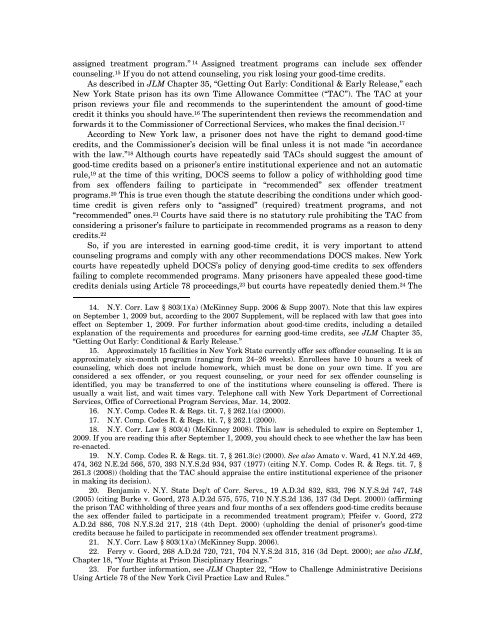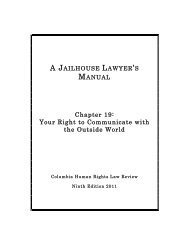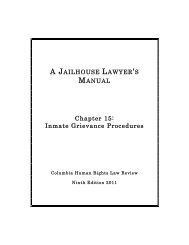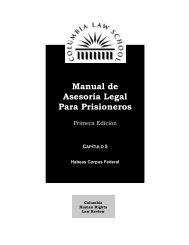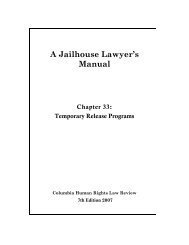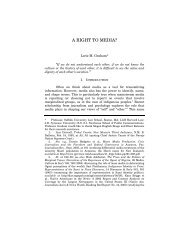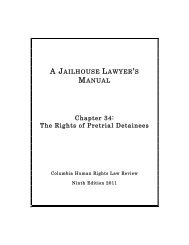Special considerations for sex offenders - Columbia Law School
Special considerations for sex offenders - Columbia Law School
Special considerations for sex offenders - Columbia Law School
You also want an ePaper? Increase the reach of your titles
YUMPU automatically turns print PDFs into web optimized ePapers that Google loves.
assigned treatment program.” 14 Assigned treatment programs can include <strong>sex</strong> offendercounseling. 15 If you do not attend counseling, you risk losing your good-time credits.As described in JLM Chapter 35, “Getting Out Early: Conditional & Early Release,” eachNew York State prison has its own Time Allowance Committee (“TAC”). The TAC at yourprison reviews your file and recommends to the superintendent the amount of good-timecredit it thinks you should have. 16 The superintendent then reviews the recommendation and<strong>for</strong>wards it to the Commissioner of Correctional Services, who makes the final decision. 17According to New York law, a prisoner does not have the right to demand good-timecredits, and the Commissioner’s decision will be final unless it is not made “in accordancewith the law.” 18 Although courts have repeatedly said TACs should suggest the amount ofgood-time credits based on a prisoner’s entire institutional experience and not an automaticrule, 19 at the time of this writing, DOCS seems to follow a policy of withholding good timefrom <strong>sex</strong> <strong>offenders</strong> failing to participate in “recommended” <strong>sex</strong> offender treatmentprograms. 20 This is true even though the statute describing the conditions under which goodtimecredit is given refers only to “assigned” (required) treatment programs, and not“recommended” ones. 21 Courts have said there is no statutory rule prohibiting the TAC fromconsidering a prisoner’s failure to participate in recommended programs as a reason to denycredits. 22So, if you are interested in earning good-time credit, it is very important to attendcounseling programs and comply with any other recommendations DOCS makes. New Yorkcourts have repeatedly upheld DOCS’s policy of denying good-time credits to <strong>sex</strong> <strong>offenders</strong>failing to complete recommended programs. Many prisoners have appealed these good-timecredits denials using Article 78 proceedings, 23 but courts have repeatedly denied them. 24 The14. N.Y. Corr. <strong>Law</strong> § 803(1)(a) (McKinney Supp. 2006 & Supp 2007). Note that this law expireson September 1, 2009 but, according to the 2007 Supplement, will be replaced with law that goes intoeffect on September 1, 2009. For further in<strong>for</strong>mation about good-time credits, including a detailedexplanation of the requirements and procedures <strong>for</strong> earning good-time credits, see JLM Chapter 35,“Getting Out Early: Conditional & Early Release.”15. Approximately 15 facilities in New York State currently offer <strong>sex</strong> offender counseling. It is anapproximately six-month program (ranging from 24–26 weeks). Enrollees have 10 hours a week ofcounseling, which does not include homework, which must be done on your own time. If you areconsidered a <strong>sex</strong> offender, or you request counseling, or your need <strong>for</strong> <strong>sex</strong> offender counseling isidentified, you may be transferred to one of the institutions where counseling is offered. There isusually a wait list, and wait times vary. Telephone call with New York Department of CorrectionalServices, Office of Correctional Program Services, Mar. 14, 2002.16. N.Y. Comp. Codes R. & Regs. tit. 7, § 262.1(a) (2000).17. N.Y. Comp. Codes R. & Regs. tit. 7, § 262.1 (2000).18. N.Y. Corr. <strong>Law</strong> § 803(4) (McKinney 2008). This law is scheduled to expire on September 1,2009. If you are reading this after September 1, 2009, you should check to see whether the law has beenre-enacted.19. N.Y. Comp. Codes R. & Regs. tit. 7, § 261.3(c) (2000). See also Amato v. Ward, 41 N.Y.2d 469,474, 362 N.E.2d 566, 570, 393 N.Y.S.2d 934, 937 (1977) (citing N.Y. Comp. Codes R. & Regs. tit. 7, §261.3 (2008)) (holding that the TAC should appraise the entire institutional experience of the prisonerin making its decision).20. Benjamin v. N.Y. State Dep't of Corr. Servs., 19 A.D.3d 832, 833, 796 N.Y.S.2d 747, 748(2005) (citing Burke v. Goord, 273 A.D.2d 575, 575, 710 N.Y.S.2d 136, 137 (3d Dept. 2000)) (affirmingthe prison TAC withholding of three years and four months of a <strong>sex</strong> <strong>offenders</strong> good-time credits becausethe <strong>sex</strong> offender failed to participate in a recommended treatment program); Pfeifer v. Goord, 272A.D.2d 886, 708 N.Y.S.2d 217, 218 (4th Dept. 2000) (upholding the denial of prisoner’s good-timecredits because he failed to participate in recommended <strong>sex</strong> offender treatment programs).21. N.Y. Corr. <strong>Law</strong> § 803(1)(a) (McKinney Supp. 2006).22. Ferry v. Goord, 268 A.D.2d 720, 721, 704 N.Y.S.2d 315, 316 (3d Dept. 2000); see also JLM,Chapter 18, “Your Rights at Prison Disciplinary Hearings.”23. For further in<strong>for</strong>mation, see JLM Chapter 22, “How to Challenge Administrative DecisionsUsing Article 78 of the New York Civil Practice <strong>Law</strong> and Rules.”


